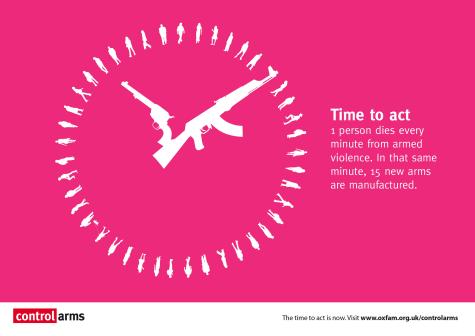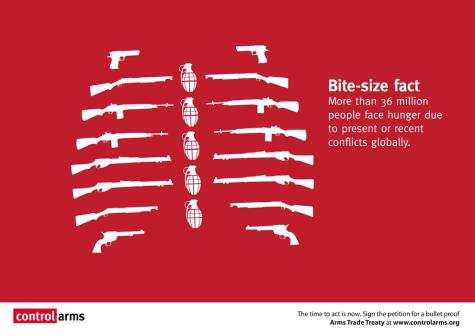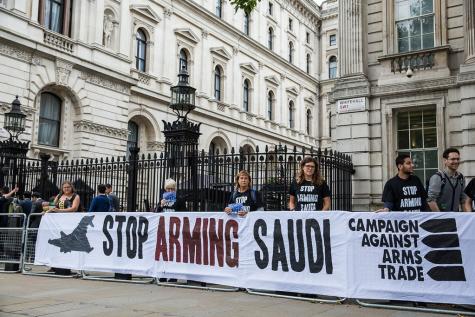ARMS TRADE = the business of death

ARMS TRADE and WEAPONS EXPORTS - The Business of Death
In this comprehensive ➡️ platform on the deadly arms trade discover over 1,000 resources to key news portals, arms dealers, fairs, profiteers, the global impact of the arms industry, and a country-by-country guide to the world largest arms exporters.
The reckless trading of arms devastates lives, the only winners are the weapons contractors - civilians always lose. Arms exports and the arms industry fuel conflict, human rights abuses, violations of international humanitarian law, repression, displacement, death, and suffering.
Despite this, the global value of weapons production, investment in high-tech weapons manufacturing, and the sale and transfer of this equipment is worth a staggering $112 billion. With 12 billion bullets produced every year, that is enough to kill everyone in the world – twice!
Learn about the NGOs calling for accountability, regulation, and a stop to the madness such at CAAT, Stop Fuelling War, and Oxfam. Find information on the Arms Trade Treaty, and also our extensive guides to Conflict Regions and the Military. German speaks should visit our partner site Bessere Welt Info for over 600 links on Rüstungsexporte und Waffenhandel.
"The world is over-armed and peace is under-funded" - former UN Secretary-General Ban Ki-moon

Arms Trade - What is the Global Impact?
For many decades the arms trade has been one of the most profitable businesses in the world. The greed of manufacturers and contractors leads to unimaginable human suffering, global instability, political repression, violence, terror, rights abuses, and the lengthening of conflicts. The industry also diverts much needed resources from social spending such as development, infrastructure, education, healthcare, social security, and peacebuilding.
Year on year we see governments prioritise military spending over societal needs. In Afghanistan, military spending amounts to more than one third of total government spending. Only 4% of their total budget is allocated to social protection. Studies show that in fragile countries military spending is typically more than twice that spent on healthcare. Health and social protection is much less likely to be prioritized in conflict-affected countries.
Poor regulation of the arms trade is also helping to worsen poverty. Violence costs Africa $18 billion annually – this is roughly the same amount as the development aid budget to the continent. Wars do not only cause death, they destroy homes, and vital infrastructure including schools, hospitals, roads, bridges, businesses, and water and electricity supplies. Low or even negative economic growth is common in war torn countries, this contributes to high levels of unemployment, poverty, and inequality.
Discover more on the impact of British and U.S. weapons in Yemen, massive weapons exports into Ukraine following the Russian invasion, and ongoing U.S. military support for Israel.

Arms fairs and Arms Dealers – Enablers of Conflict
Arms fairs are supermarkets for arms dealers. These enormous events promote weapons sales and provide arms dealers with the chance to market their products to military representatives, government officials, and other interested parties.
Governments such as the UK actively support these events including the DSEi (defence and security trade exhibition) which is the largest of its kind in Europe. There are many campaigns calling to drive these arms traders out of town including CAAT and Disarm DSEi who support local resistance and protests as well as raising awareness of the complicity of these weapons in human rights abuses, war, death, violence, and repression.
Arms dealers are salesmen whose goods include deadly weapons, ammunition, fighter aircraft, helicopters, war ships, surveillance and radar systems, tanks, rifles, and all manner of guns and small arms. They must navigate international relations, regulations, and governmental agencies in their coordination of these hugely profitable deals. As one of the most corrupt industries in the world, these deals are coated in secrecy, bribery, political scandals, and fraud.
Arms trafficking is the 9th largest criminal market and is estimated to be worth between $1.6 to $2.2 trillion. With the market flooded by weapons it is much easier for them to fall into the wrong hands especially in the case of conflict-related stockpiles. It is no coincidence that the 5 countries with the highest arms trafficking rates in the world are Yemen, Afghanistan, Central African Republic, the Democratic Republic of Congo, and Iran.
In 2015, approximately 640 million illicit firearms were in circulation globally. The trade is worth between $130 - $250 million, about 15% of the total trade in legal firearms. Illicit arms trading results in further illegal activity, violence, and financially supports organised criminal groups.

Who are the Top Arms Profiteers – Merchants of Death
Military corporations and weapons manufacturers need wars to make profit – more conflict = more money!
Spending by the Pentagon since the start of the war in Afghanistan totals $14 trillion. One third of this has gone directly to military contractors. Almost all of these contracts have gone to just five major corporations -
• Lockheed Martin
• Boeing
• General Dynamics
• Raytheon
• Northrop Grumman
In 2020, Lockheed Martin received $75 billion in contracts from the Pentagon - more than one and a half times the annual budget for International Development. These companies take advantage of wartime conditions through lobbying, overcharging, and fraudulent activities.
Since the removal of U.S. military presence in Iraq and Afghanistan, exaggerated security risks from China and Russia have been used to justify maintaining the unprecedentedly high Pentagon budget.
Developed countries dominate the arms trade and are the primary manufacturers and exporters of arms. These countries therefore have major influence on international relations, security, and stability. They also bear significant responsibility for regulation of the arms trade, upholding ethical standards, and shouldering accountability for the flooding of weapons into fragile states.
We provide in-depth guides to the top 7 leading exporters of weapons, as well as special insight into the arms trade in Europe and Israel.
#1 USA - 40%
#2 Russia – 16%
#3 France - 11%
#4 China - 5%
#5 Germany - 4%
#6 Italy - 4%
#7 Britain - 3%
With the exception of Germany and Italy, these major weapon exporting countries make up 5 of the 9 states which stockpile nuclear weapons.

Arms Trade Treaty - Regulation and Control
Rife with corruption, complicit in rights abuses, and responsible for flooding volatile states with deadly weapons, the need for strict regulation, transparency, and accountability in this multi-billion-dollar industry is paramount.
We are sold the idea by governments that it is only the illegal arms trade and arms trafficking that is damaging, but the reality is that the majority of arms sales to repressive regimes and into conflict areas are perfectly legal and supported by governments.
The murky world of arms sales means that even despite international agreements such as the Arms Trade Treaty, countries are able to break even their own laws on arms exports. Adopted in 2013 the ATT aims to regulate international trade in weapons and prevent illegal trade. Implementation and enforcement of the treaty is patchy at best, agreements vary from country to country, and lack of transparency and accountability allows the biggest exporters to continue relatively unheeded.
The Merchants of Death War Crimes Tribunal taking place in November 2023 is aiming to hold U.S. weapons manufacturers accountable. They are knowingly producing, selling, and reaping enormous profits from an industry which is responsible for the deaths of thousands in armed conflictsaround the world.
The tribunal will hear evidence through testimonies and interviews which will be later be reviewed and a verdict rendered. War crimes, crimes against humanity, and the violation of U.S. Federal law are the potential charges which could be faced. So far, subpoenas have been served to Lockheed Martin, Boeing, Raytheon, and General Atomics.

How Can We Better Control the Arms Industry?
The arms trade is a huge barrier to peaceful solutions in conflict. The impact of the industry on international peace, human rights, social justice, and the environment is insurmountable. The current control of arms sales is so lax that it is easier to import AK47’s than it is to import bananas.
First and foremost global cooperation is needed in order to improve control of the arms trade. Strengthening and greater regulation of the UN Arms Trade Treaty would go a long way to ensure that weapons do not end up in the wrong hands. Transparency and accountability need to become priorities, as well as reining in the rampant profits of weapons contractors.
A collaborative effort to record arms transactions, and detect and prevent illegal deals, fraud, corruption, and lobbying efforts is essential. Public awareness of this shady industry is vital in putting pressure on politicians, military officials, and arms dealers to put people before profit. As citizens we can make sure we vote for candidates who advocate for disarmament, peaceful solutions, and increased control of the industry, we can also join protests calling for peace, ceasefires, a ban on arms fairs, and against spiralling military budgets. A responsible approach to security and defence will contribute to a much safer world and allow governments to more evenly distribute resources to social welfare, health, education, and development.
“The problem is that the global arms trade is entirely free of international regulation. In a world in which the flow of consumer goods is governed by a plethora of international conventions and regulations, deadly weapons have an uncanny knack of slipping through the net” - Hilary Benn.
Author: Rachael Mellor, 14.11.23 licensed under CC BY-ND 4.0
For further reading on the Arms Trade see below ⬇️
Info on ARMS TRADE = the business of death
- Arms Trade News[45]
- Global Arms Trade Impact[110]
- NGOs - Stop Arms Trade[93]
- UN Conference on the Arms Trade Treaty (ATT) - a fig leaf[83]
- Arms Fairs - supermarkets for arms dealers[124]
- USA the #1 - 40%[163]
- Russia #2 - 16%[33]
- France #3 - 11%[40]
- China #4 - 5%[31]
- Germany #5 - 4%[48]
- Italy #6 - 4%[17]
- Britain #7 - 3%[332]
- Europe[93]
- Israel[111]
- Other Countries[39]
- Arms Dealers[141]
- Food not Bombs[17]
- Top 10 Arms Profiteers[73]
- Arms Trafficking[91]
- Merchants of Death[88]